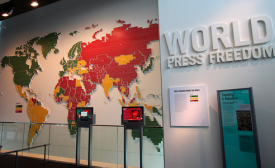united states
The United States, hoping to avert economic chaos in Ukraine, is prepared to send financial support to supplement aid from the International Monetary Fund, the White House said on Monday. "The United States, working with partners around the world, stands ready to provide support for Ukraine as it takes the reforms it needs to, to get back to economic stability," White House spokesman Jay Carney told a news briefing.

Among the principal assets of U.S. public diplomacy are American values. They are admired around the world, even by many people who dislike American policy. No other political system offers such extensive individual and systemic freedoms as those enumerated in the Bill of Rights. Showcasing and standing up for those freedoms should be at the heart of U.S. public diplomacy.
What an awesome sight it was, all those Olympians holding hands with teammates of the same gender, in quiet but unmistakable defiance of Russia's anti-gay laws and the International Olympic Committee's stated ban on political protest.
On April 12, 2013, the U.S. Embassy in Kyiv hosted a day-long conference for Ukrainian women entrepreneurs focusing on business owners of small and medium enterprises. The goal of the event was to promote the importance of Ukrainian women in fostering economic growth, build the confidence of women entrepreneurs to take on leading roles in business and society, provide practical tools for further empowerment, and serve as a platform for networking.
Among the principal assets of U.S. public diplomacy are American values. They are admired around the world, even by many people who dislike American policy. No other political system offers such extensive individual and systemic freedoms as those enumerated in the Bill of Rights. Showcasing and standing up for those freedoms should be at the heart of U.S. public diplomacy.
The arrest of Joaquín “El Chapo” Guzmán Loera, the head of the Sinaloa cartel, on Saturday was an event of enormous importance in the Mexican government’s fight against organized crime. Mexican public opinion had long ago decided that this government, and the previous one, were not serious about hunting for Guzmán, preferring the relative stability and lower-violence approach of the Sinaloa cartel to the more militaristic style of other cartels, such as the Zetas.
With Ukraine's parliament dismantling the last vestiges of ousted President Viktor Yanukovych's government, the Obama administration warned Russia against sending troops into the country and told Moscow that it should allow Ukrainians to freely determine their own future. Appearing on Meet the Press Sunday, National Security Advisor Susan Rice was adamant about limiting Russia's role in Ukraine going forward.
Public diplomacy has always been an important tool in communicating a country’s policies, values, and culture. However, the means through which these goals could be achieved considerably changed in the last one hundred years, and politicians as well as scholars have had to face new challenges and adapt to a new media era.







